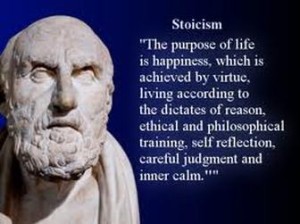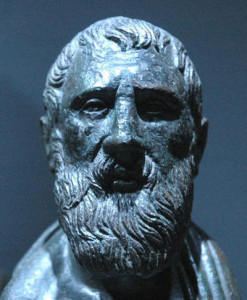Stoics believed that they were part of a divine plan and that whatever happened was meant to be. Stoics got their name because Zeno taught from a porch (stoa in Greek). To the stoics, a good life meant a virtuous one. They refused to be ruled by their feelings, because emotions just got in the way of good judgement. Their philosophy was to put up with their lot in life. Stoics didn’t try to fight fate.Their motto was “go with the flow”. Wanting what they couldn’t have could only bring unhappiness. They decided to want whatever they got – this way they could never feel let down.
 The stoics assume that the good life for a human being is life according to nature. To find what accords with nature, they attend to the development of human being, and to the expanding exercise of his capacities. A human being’s aims are not like an animals’, an unselfconscious and uncoordinated series of appetites. Instead the agent soon learn to and arrange the satisfaction of his desires by reason; soon reason modifies his desires; once he sees that the satisfaction of some of them conflicts with the satisfaction of others. Having used reason instrumentally, to satisfy his desires, he comes to value the exercise of reason for its own sake.
The stoics assume that the good life for a human being is life according to nature. To find what accords with nature, they attend to the development of human being, and to the expanding exercise of his capacities. A human being’s aims are not like an animals’, an unselfconscious and uncoordinated series of appetites. Instead the agent soon learn to and arrange the satisfaction of his desires by reason; soon reason modifies his desires; once he sees that the satisfaction of some of them conflicts with the satisfaction of others. Having used reason instrumentally, to satisfy his desires, he comes to value the exercise of reason for its own sake.For Stoics, emotions were thought of as false judgements, so that the stoic can also be characterised as apatheia (freedom from passion). once again there is a contrast with Epicureanism. The same applies to their politics. whereas Epicureans had little to do with society at large, being concerned more with friendship within local communities, the Stoics took over the Cynic idea of man as citizen of the world. Epicurus had thought of justice as the result of a sort of social contract. the stoics embraced the idea of natural law and the idea of justice as involving a conformity with nature, and so applicable to all men. it was from the stoics that the concept of natural law and natural rights were handed down through the Roman concept of “the common law” of nations, to the middle ages. It was the concept which evidently had appeal t those Roman who found themselves oppressed by emperors such as Nero, and during this period Stoicism, particularly in this moral and political aspects, found many adherents.
